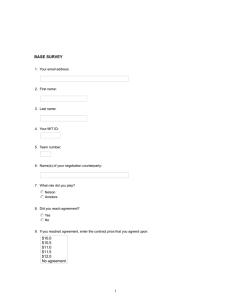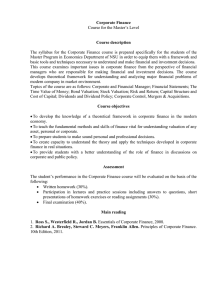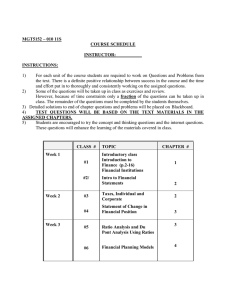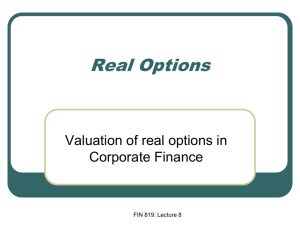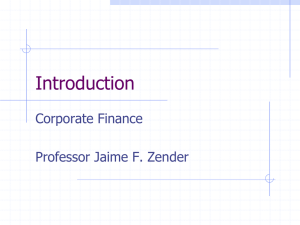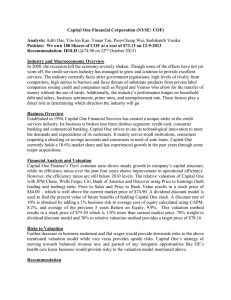15.997 Practice of Finance: Advanced Corporate Risk Management
advertisement
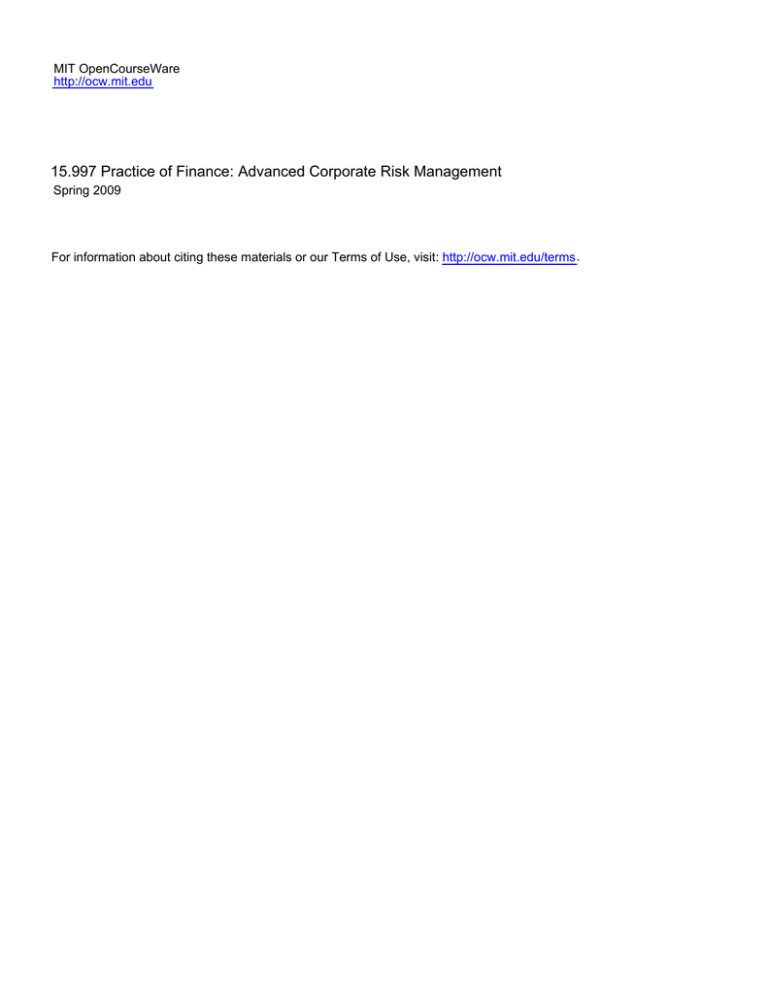
MIT OpenCourseWare http://ocw.mit.edu 15.997 Practice of Finance: Advanced Corporate Risk Management Spring 2009 For information about citing these materials or our Terms of Use, visit: http://ocw.mit.edu/terms. Valuation MIT Sloan School of Management 15. 997 Advanced Corporate Risk Management John E. Parsons Review The risk-neutral valuation framework starts by going one step deeper than the traditional risk-adjusted discount rate. The risk-adjusted discount rate (1) assumes a linear exposure to the underlying factor risk, and (2) applies a single discount factor to the expected cash flow. This is equivalent to applying different discount factors to the “up” and “down” states. These are the forward state prices. The risk-neutral valuation framework recovers these forward state prices. With these in hand, we are no longer restricted to valuing only linear exposures. We can value any non-linear pattern of exposure. The risk-adjusted discount rate method cannot do this because it stopped before recovering the two different discount factors, and only applied the “average” discount factor to the “average” or expected cash flow. 2 1 Turbo-Charged Valuation Once we have recovered the risk-neutral probabilities (i.e. the forward state prices) we can value any non-linear pattern of exposure. Whole body of “option pricing” or “derivative pricing” theory is just working out a compendium of formulas for different problems. Behind them is the general principle. Illustrate this with a case study… 3 Valuing Option-Like Investments Use risk-neutral method… Model the stochastic process for the underlying risk variable. Specify the risk-neutral process, i.e., calculate the risk neutral probabilities. Value any derivative claim using the risk-neutral method, i.e., using the risk-neutral probabilities to determine the certainty equivalent, and discounting at the risk-free rate. 4 2 An Aluminum Supply Contract with a Structured Price Clause aluminum producer and major consuming firm 20-year term Fixed annual quantity Price clause ¾ ¾ ¾ ¾ ¾ ¾ ¾ ¾ ¾ Floor price equal to $1,644/Ton Between $1,644 and $1,808/Ton, the world market price From $1,808 to $2,308/Ton, price rises by the world market price, From $2,308 to $3,008/Ton, price rises by 25% of the world market price, From $3,008/Ton, price rises by 50% of the world market Price All trigger values grown at the price of inflation. 5 Contract Payoff Diagram 4000 3500 contract price 3000 2500 2000 1500 1000 500 0 0 1000 2000 3000 4000 world market price 6 3 Option Analogy Payoff diagram can be converted into a batch of options on the aluminum price ¾ ¾ Find the options! The 20 year contract means a series of options, one set for each year Options can be priced using a model for the price evolution and a model for pricing risk The value of the contract is the value of the bundle of options reshaping the payoff, summed across the full series of maturities. 7 Floor Price as a Put Option Receive the world market price, Plus a put option with the right to surrender the world market price in exchange for the floor price, i.e., a put option on aluminum with a strike price equal to the contract floor price. 8 4 Effect of a Put on the Payoff 4000 3500 contract price 3000 combined 2500 2000 1500 world market price 1000 500 put 0 0 1000 2000 world market price 3000 4000 9 A put option reshapes the payoff at the low end… 4000 3500 contract price 3000 2500 2000 1500 put value gained 1000 500 0 0 1000 2000 3000 4000 world market price 10 5 How to Capture the Remainder? 4000 3500 3000 contract price Value surrendered 2500 2000 1500 put value gained 1000 500 0 0 1000 2000 3000 4000 world market price 11 Full Contract Equals… Fixed price of $1,644/Ton Plus a Call with the exercise price of $1,644/Ton Minus a Call with the exercise price of $1,808/Ton Plus 25% of a Call with the exercise price of $2,308/Ton Plus 25% of a Call with the exercise price of $3,008/Ton. 12 6 Valuing the Options Suppose the world market price of aluminum follows a random walk…i.e., GBM Choose a convenience yield, …i.e., a dividend rate and expected rate of growth of aluminum prices Estimate the volatility Apply Merton’s variation on Black-Scholes, the value of an option on dividend paying stock… 13 Spot Price Model Matters Valuation with the Estimated Process: ATM Calls of Varying Maturity $350 Option value ($/Ton) $300 $250 $200 $150 $100 O-U RW $50 $0 10/31/95 10/31/99 10/31/2003 10/31/2007 10/31/2011 10/31/2015 Date Figure by MIT OpenCourseWare. 14 7 Spot Price Model Matters Valuation with the Estimated Process: ATM Calls of Varying Maturity $350 Option value ($/Ton) $300 $250 $200 $150 $100 O-U RW $50 $0 10/31/95 10/31/99 10/31/2003 10/31/2007 10/31/2011 10/31/2015 Date Figure by MIT OpenCourseWare. 15 Spot Price Model Matters Valuation with the Estimated Process: ATM Puts of Varying Maturity Option value ($/Ton) $400 $300 $200 O-U $100 RW $0 10/31/95 10/31/99 10/31/2003 10/31/2007 10/31/2011 10/31/2015 Date Figure by MIT OpenCourseWare. 16 8 Spot Price Model Matters Valuing the Contract for Alternative Processes Cumulative contract present value ($Millions) $300 $245 Million RW O-U BV $250 $200 $206 Million $150 $140 Million $100 $50 $0 10/31/95 10/31/99 10/31/2003 10/31/2007 10/31/2011 10/31/2015 Date Figure by MIT OpenCourseWare. 17 Risk & Valuation: When Does It Matter Underlying state variable has asymmetric risk – extreme downside. Underlying state variable risk does not grow linearly with time – don’t compound discount rate. Project payoff is non-linear – e.g., a call option on the underlying state variable. 18 9 Main Myth of Risk-Neutral Valuation Do you need traded securities? No. ¾ ¾ RN valuation is just about consistent valuation of all non-linear payoffs. Any equilibrium model like the CAPM implies a risk-neutral valuation framework. Traded securities make the starting point of the valuation more reliable. But this has nothing to do with the RN framework. 19 Second Myth of Risk-Neutral Valuation Real-option pricing is a competitor to the DCF framework. RN is just an extension of the DCF framework. 20 10
